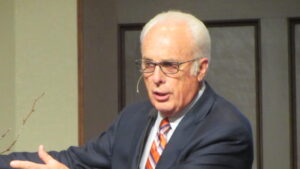The Christianity Today article, “1 in 4 Pastors Plan to Retire Before 2030,” leads to the question: how do we train up the next generation of pastors? As one who is both in local church ministry and in the world of academia, I find myself positioned to reflect on this question as it pertains to both the role of the Church and the role of the bible college and seminary (or more generally, the academy) in training up new pastors.
I have some friends who, on the academic side, loathe the lack of scholarly rigour found in some bible colleges and seminaries. And to be sure, if one were to compare the curriculum of many theological institutes today with what they were even 100 years ago, one would be staggered by the changes. At one point, pastors needed to know Latin, Greek, and Hebrew on a working level in order to graduate with an MDiv; today, this type of language acquisition is not even common amongst PhD graduates. Things have changed, and the academic rigour is not what it used to be. (However, it should be noted that this is not just the case for theological institutions, but postsecondary education more generally.)
On the other hand, I have friends who are through and through practitioners, and they, ironically, lament the academic nature of bible colleges and seminaries. They loathe the requirements to learn Greek and Hebrew; they do not understand why people need to learn how to research and write 15-page papers on systematic theology; and they think the time spent in the classroom would be better spent in ministry. If only we eradicated academia from the bible college and seminary, then, they believe, we could effectively train pastors for the church.
So what is the solution?
I often find myself in the middle. As one who believes in the importance of scholarly and academic rigour in the ministry, I uphold the importance of the seminary and bible college without reservation. But as one who serves in the church, I also see the importance of the ministry and training found in the local church. What is needed is not one over the other; what is needed is both. There is a role for the academy in training pastors, and there is a role for the church in training pastors as well.
The Academy
The role of the academy is not, primarily, to become a place of practical education. The academy is meant to be a place where ministers are trained in the philosophical, biblical, and theological requirements needed for faithfully serving and teaching in the church. Christ called us to love the Lord with all our mind—this leads to the need for an intellectual component of the Christian faith. And as pastors are responsible for preaching or teaching the Bible on a regular basis, there is a need to know how to teach it, and to teach it faithfully.
Moreover, the academy is meant to train pastors how to learn for themselves. The harsh reality is that one cannot do responsible research and learning independently without some kind of academic formation. Yes, you can read books; yes, you can watch YouTube videos. But such self-learning is always guided by your desires. You read the books you want to read; you watch the videos you want to watch. The key with academic formation is that it gives you the foundation that is needed across all the fields of theology, whether you want it or not. It equips you in the biblical languages; it forms you in the theology of Church history; it gives you overviews of biblical books. The academy is needed for a well-rounded education that enables you to learn more going forward; such a foundation cannot be overlooked or easily replaced.
The academy, primarily, is meant to form people for a life of ministry. It is not a place to learn how to make a budget. It is not the place to learn how to run a pizza lunch for your youth group. It is a place to be formed theologically and biblically. The reason you “didn’t learn how to do X in seminary” is because that is not what seminary is for. You learn that on the ground, at the church.
The Church
The role of the church in ministry formation is to take students who are training in bible college or seminary and to give them the opportunity to serve. This is the place they learn the nuts and bolts of ministry. This is where they learn how to take their Greek exegesis class and make it applicable to Jr youth (which it is, by the way). This is where they take the philosophical, biblical, and theological foundation they have received and implement it in the life of the church.
Thus, the church needs to provide opportunities for young people to serve and to be trained. The church needs to offer internship opportunities for students, as they partner with the bible colleges and seminaries. The church needs the seminary, and the seminary needs the church.
Moreover, the church needs to identify and send people from the church to the academy. They need to support students financially as they go to seminary. They need to encourage and hold accountable students as they learn. And they need to mentor students to see how their training and formation is valuable and useful in the life of the church.
Conclusion
In my experience, there is a bit of a mutual blame game that happens between the church and the academy. If only the church were more academic, the academy demurs, then the church would be better. If only the seminary were more practical, the church believes, there would be more pastors. But rather than wanting the church to be the academy or the academy to be the church, we need both. We need both institutions in order to equip the next generation of pastors.























